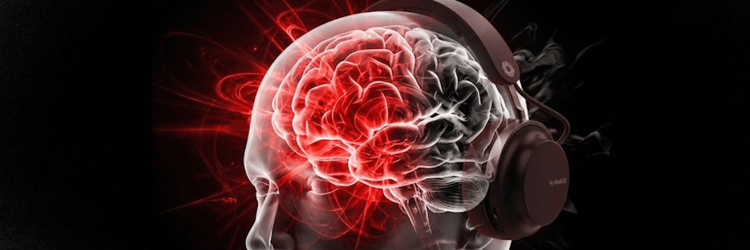Creepy Pasta. The Conjuring. Bloody Mary.
These are what kids think horror stories look like.
But adults?
Our horror is different.
It's the:
“Wow, I stared at the screen all day and got nothing done.”
“What do you mean it's already 1:30 PM?!?!?!”
“Oh yeah, I was going to do that. Can’t believe it’s already been a year.”
Time slips when your mind controls you. It slips when the only thing you can focus on is Instagram reels or Reddit rabbit holes titled “AITA for slapping my spouse and then making them apologize to me?” (You are, btw.)
This isn’t failure. This is the curse of this generation: lack of focus.
If your career feels stuck — like you just can’t get anything done —
If every BuzzFeed quiz tells you to quit your job and you seriously consider it every six months?
Maybe stop letting internet quizzes run your life.
Give blogs a chance (us, specifically).
Because you're probably not burnt out, depressed, or have a rare cancer.
You’re probably running on a low attention span. And you need to work on it.
We’ll show you how.
What is Lack of Focus?
Lack of focus refers to the mental inability to stay on task or resist distractions. It's not about laziness or incompetence; it's about the constant battle our brains face in an environment filled with interruptions and stimuli vying for our attention.
It’s that thing that eats your time while pretending to be something else.
It doesn’t show up like a big dramatic villain, no sir. It rolls in quietly. It borrows your brain for five minutes, then 10 minutes, and suddenly you’ve spent all day distracted.
Sitting on your shoulder like the devil - making plans you don’t execute and lists you never finish.
Why does it happen?
- Distractions - You think you’re just checking your phone “real quick.” But the truth is: apps, platforms, even the little notification dots are all designed to hijack your dopamine system. You get micro-rewards from scrolling, clicking, and reacting.
The result? Your brain learns that tiny, pointless tasks feel better than deep, meaningful work. And it starts to prefer those instead.
- Multitasking - No, you’re not being efficient. Your brain is just repeatedly stopping one task and starting another. Each switch burns mental energy and breaks your concentration loop. Over time, this creates a weird kind of surface-level productivity: you're doing a lot, but finishing nothing. EOD you’re just left with a whole lot of unfinished tasks and completely stressed for the next day.
- Burnout - When you’re chronically stressed, your brain shifts into survival mode. The nervous system prioritizes basic functions and sidelines the prefrontal cortex — the part responsible for focus, logic, and decision-making. Translation: The more stressed you are, the more your brain function reroutes toward survival, not strategy.
- Brain fog: Sleep-deprived. Caffeinated. Simultaneously anxious and numb. Beautiful combo. This is burnout’s quieter, more shy cousin. Sleep-deprived, overstimulated, under-rested — your brain loses clarity. You feel mentally slow, emotionally flat, and weirdly tired. Focus? HAH. Not even with your 10th coffee of the day. Read More: 5 tips on reducing brain fog and increasing focus
Why Focus is Crucial for Career Growth
Lack of focus stalls you like nothing else. When your attention span at work is fragmented, your output suffers.
How?
Your decision-making gets rushed, your problem-solving tanks, and the burnout + brain fog combo makes it nearly impossible to stay logical or creative. One or two off days? That’s a write-off. But when this becomes a pattern, career growth flatlines.
Focus and productivity go hand in hand. Deep, uninterrupted work what we call flow state is where real value happens. Not when you’re constantly multitasking because you’re too distracted to complete the tasks you’ve started.
Strong cognitive performance isn’t about working longer. It’s about working sharper. If you’re wondering how to improve focus at work, the answer is consistency over intensity. Improving focus and concentration is a game-changer most people ignore.
Read more: About how to crack sustaining flow state at work, with ease.
The 9 Effects of Lack of Focus

Lack of focus doesn’t feel catastrophic. And that’s the real problem.
It starts off feeling normal, manageable, even. Just “one of those days”… for the tenth time this month.
You’re tired. Disinterested. You push everything to “later.” And if you think nobody’s noticed? You’re wrong.
You stop finishing. You stop starting strong.
You lose track of tasks, of ideas, of momentum. And what’s worse? You know you’re capable of more but your output doesn’t show it.
- You start missing deadlines (often). - When you can’t stay focused, even simple tasks take longer. You're starting late, switching tabs, answering messages mid-task, and suddenly a 30-minute job becomes a two-day ordeal. Over time, people start expecting delays. And once reliability slips, trust follows.
- You're always busy but rarely effective. - Your calendar’s full, your to-do list never ends, but nothing feels finished. Without focus and productivity working together, you stay in shallow work mode. Real value comes from flow state and focus, not reacting to every ping.
- Your decision making becomes foggy. - Lack of focus weakens your cognitive performance, especially when decisions need clarity and logic. You miss details, rush things, and second-guess yourself. Focus lets your brain think, not just react. Without it, decisions feel random. Find out more about cognitive health and why it matters
- You can’t stay consistent. - One week you're sharp, the next you're scattered. This isn’t random it’s what happens when your attention span at work keeps breaking down. Too many tasks, and too little structure results in your productivity and focus never stabilizing.
- You stop growing. - When you can’t focus, you stop learning. Career growth takes deliberate effort. No, not just working hard, but working smart. Constant autopilot mode kills space for creativity and improvement. You get stuck in a rut, just completing tasks, not developing your skill sets.
- People notice, and not in a good way. - Colleagues clock the missed messages, vague updates, and half-finished thoughts. Even if you’re trying, perception becomes reality. Once you’re seen as distracted or unreliable, that reputation’s hard to shake.
- You doubt yourself. - You know you're capable of more, but your results say otherwise. That mismatch peels away your motivation and focus. If self-doubt is creeping in, it’s time to rebuild with focus-driven habits and deep work that actually reflects what you’re capable of.
- Burnout creeps in fast - When you’re constantly multitasking and never fully finishing, your brain doesn’t get a break. Your attention span gets shorter. The mental fatigue builds. Burnout becomes your baseline and you stop realizing how exhausted you are.
- You stop doing work that actually matters. - Without space, there’s no strategy. Without stillness, no creativity. You lose the room to lead, to think, to grow. If you don’t improve your focus, you’ll keep chasing low-impact tasks while missing the high-value opportunities that define real career growth.
What Causes Loss of Focus at Work?
Loss of focus at work is often caused by constant notifications, email overload, and unclear priorities. When your day is full of distractions and your goals feel disconnected, productivity and focus take a hit and so does your performance.
Poor sleep, unmanaged stress, and burnout don’t help either. Without intentional systems, even high performers lose steam.
If you want focus and career success, you need more than hustle - you need clarity, boundaries, and habits that protect your attention because it actually matters.
Improving Focus & Regain Career Control
To improve focus and concentration, start with clear goals. Then batch similar tasks - your brain likes flow, not chaos. This is how you create conditions for flow state and focus, not constant switching and half-finished thoughts and tasks.
Small systems = big impact.
The more you get intentional with tools, habits, and even wearables that push you into the deep work zone like Sychedelic.
The effects of scattered attention are quiet but they compound fast. Being focused isn’t luxury or luck - it’s cultivated with discipline. It’s what differentiates the high-achievers from the crowd.
The best part is that you don’t need a 7000-page guide to become a high achiever. You just need to start small. Start being intentional about how you work. Protect your attention. Build habits that support productivity and focus.
Try one small focus shift today, and your future self will thank you.
And if you’re ready to take it seriously, book a demo with Sychedelic.
FAQs
What are the effects of lack of focus at work?
The effects of lack of focus at work include missed deadlines, reduced quality of output, poor decision-making, and damaged professional reputation. Over time, it can stall career growth and lower your confidence.
How does poor concentration affect productivity?
Poor concentration and productivity are closely linked. When you’re distracted, tasks take longer, mistakes increase, and your work loses impact. Focus is essential for delivering high-quality results consistently. "🎧 Bonus: Here’s what the top 1% listen to for boosting their focus."
Can lack of focus lead to burnout?
Yes, lack of focus at work often leads to multitasking and mental overload, which can trigger chronic stress and eventually burnout. A scattered mind drains more energy than a focused one.
What is the long-term impact of poor concentration?
Long-term, poor concentration can limit career opportunities. It affects your ability to think strategically, complete meaningful work, and maintain a reliable track record — all critical for professional growth.
How do I regain focus in my career?
To regain focus in your career, start by setting clear goals, limiting distractions, and creating space for deep work. Improving focus and concentration builds better habits, sharper output, and renewed momentum.
More in Focus













